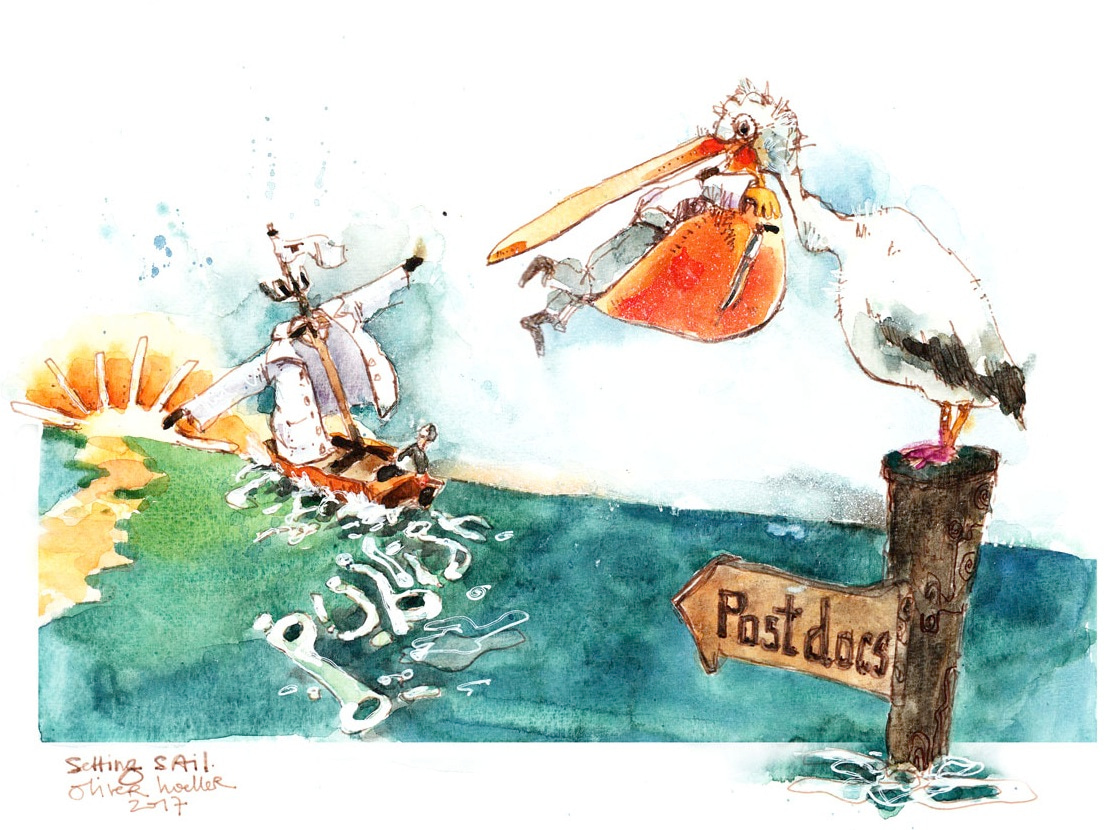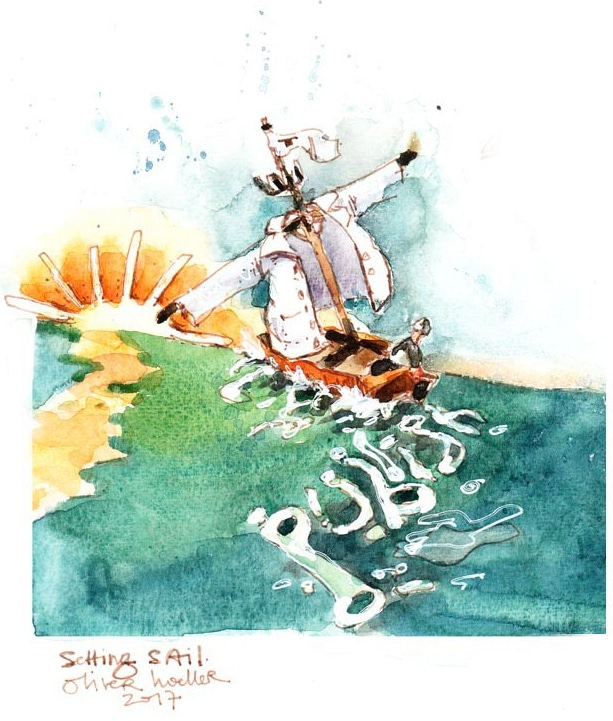

From TIR's series of “How to…” guides, here's some advice on how to choose a postdoc position in academia.
Caveat: As in the previous articles in this series, there will be plenty of people out there who have done the exact opposite of everything that’s recommended here, and profited by it. There is definitely no bulletproof recipe for success, and luck plays a huge role no matter how talented you are. This guide is intended primarily to introduce a few of the parameters that you might find it helpful to consider as you begin your search.
With that in mind, let’s consider the who/why/where/when/what…and how of finding a postdoc position (but not in that order).
WHAT? During your PhD you will, broadly speaking, have become expert in three distinct areas: (i) organism/system – e.g. fruit flies, trypanosomes, cell lines, (ii) technique – e.g. cell biology, biochemistry, structural biology; (iii) conceptual area – e.g. cytoskeleton, cell adhesion, signal transduction. A good rule of thumb when beginning to consider your postdoc destination is that you should aim to change ONE of these three things. This gives you a chance to learn something new, and bring something new to the group that you join. Change none of the three, and you’re basically just prolonging your PhD project in a new group (and providing them with nothing except a fresh pair of hands); change two or even three, and you’re giving yourself a very steep hill to climb.
WHEN? It’s probably best if you allocate ONE YEAR to the search, so as soon as you get into the final year of your PhD, get cracking! Have a think about whether you want to change your organism, technique, or conceptual area, and then do the requisite reading to get yourself up to speed in that particular niche. Ask your supervisor for advice if you can, and canvas other faculty members if possible – especially those who might already be active in a similar area. Identify candidate labs, namely the big hitters or rising stars in the chosen area – around three is a good number. Have a think about what you might like to do based on your current experience and their recent work – it’s always a plus if you know what part of the lab’s research portfolio you want to contribute to, and if you can suggest a project of your own then that’s a sign that you’re already thinking independently. Once you’ve done all that, make your approach. An informal e-mail request is fine, and you can learn a lot from the type of response you get too. It’s never too early to get the ball rolling – most labs are happy to have incoming personnel in the pipeline, and in addition it may take a while to secure a Fellowship if needed (and don’t forget that visas can sometimes be time-consuming).
WHO? The “Nine Types Trilogy” of principal investigators (as well as postdoc and PhD students) produced by Alexander Dent while he was a postdoc at NIH remain an eerily accurate summary of some of the personality types that still dominate the mentoring landscape. As with choosing a PhD, the single most important criterion is that you can forge a good personal relationship – especially so given that your postdoc mentor will probably be the most influential person to you in career terms, and the one who you’ll be asking for a reference from until you retire. With that caveat in mind though, probably the two that give the best chance of YOUR success are the “demigod” and the “rising star”. Demigods will have money and reputation; on the flip side, they are usually absentee landlords who think in broad brushstrokes instead of nuts and bolts, and be wary of ones that are so old they might die (you need those reference letters, remember). Rising stars are closer to the coal face and have more recent hands-on experience, but may not have the same financial resources (and you need the freedom that brings – this is not a time to be handicapped), and be under considerable career pressure themselves if not tenured.
WHERE? This is simpler than it might seem, given the enormous global spread of contemporary research – GO WHERE THE ACTION IS. Whatever niche you’re choosing, locate the hotspots where that field is strongest and target those. This is not a time to be heading into the metaphorical desert. Ideally, find a strong department or cluster, as this will have a concentration of knowledge and expertise. If you’re planning on joining a large field, then you can probably choose the part of the world you’d like to go to; in a smaller field you may not be able to be fussy. That said, wherever you go you’re likely to be there for 2-4 years at least, so it helps if the location is palatable.
This is also a very good time to head abroad, so do give serious thought to changing country. This could be your very own “hero’s journey”, and there are big gains to be made in terms of experiencing different academic systems and national cultures. Again, this kind of personal enrichment gives you a broader perspective to bring back with you.
WHY? This is the tricky one. Why do a postdoc at all? (And no, I’m not asking that in the context of the lucky ones who’ve had such outstanding luck in their PhDs that they can think of applying directly for faculty positions) A postdoc position is not a chance for you to delay the rest of your life. The best motivation for starting a postdoc is if you want to be running your own lab one day. Don’t forget that you are probably at your most employable in a broader sense when you finish your PhD – all of the theoretical knowledge that comes with an undergraduate degree as well as the postgraduate training that puts you into a very select group of the national workforce. But as soon as you start a postdoc, you are committing yourself in one direction and if you subsequently decide that, say, you want to go into industry then that will mean explaining why the company/organisation should hire you and not someone who’s straight out of their PhD. In this sense, this is one of the many areas where the worlds of science and theatre overlap – it’s said that you should only go into theatre if you couldn’t possibly imagine doing anything else, and the same applies to academia to an extent. In both cases, you will need to be lucky; have a think if you could still be happy if that lucky break never arrives.
HOW? As noted above, the simplest way to go about it is to talk one-to-one with the group leader(s) whose lab(s) you’d like to join. There really is no substitute for face to face contact when it comes to the business of putting faces to names, and personalities to reputations. Informal approaches are best, so take the opportunity to ambush people at conferences or if they’re in town for a seminar, PhD exam, or similar. Good labs will probably be oversubscribed, so establishing a personal rapport can really help. Do you like them? Remember this could be a career-long association. Can you learn from them? There’s little to be gained from working for someone who knows less than you. Most importantly, and similarly to a PhD, would you feel comfortable asking them for help? Ming the Merciless is nobody’s idea of a postdoc mentor.
Secondly, make sure you visit the lab and get a chance to talk to all the current members of the group. You want an environment and work colleagues that feels like the “X-Men: First Class” movie, not the downtrodden masses building a pharaoh’s tomb. Are the group members happy? Do they feel well-supported? Do they get on with one another? Do you think you could learn from them? Who will still be around when you plan on arriving? (remember that turnover is an inevitable feature of academic life). If you can, get advice from others in the field. It’s always helpful to find out what happened to previous members of the group, but such information is often not easy to come by.
BON VOYAGE/GUTE REISE Finally, remember that a postdoc position is primarily but not exclusively about doing research – you should also be seeking to acquire and develop the skills that will enable you to survive (and thrive) as a group leader in your own right. Authorships – especially first authorships and corresponding or even last authorships – are critical, but so are signs that you can generate money (fellowships, grants), and personal networks of collaborators and colleagues.
Last of all – good luck!

[Originally posted in Total Internal Reflection]





Join the FEBS Network today
Joining the FEBS Network’s molecular life sciences community enables you to access special content on the site, present your profile, 'follow' contributors, 'comment' on and 'like' content, post your own content, and set up a tailored email digest for updates.